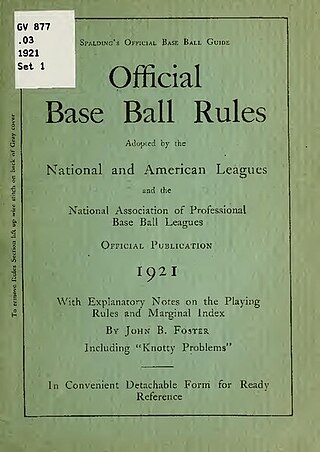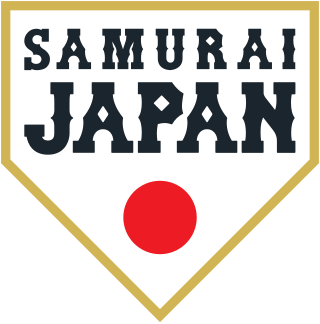Related Research Articles
In baseball, an earned run is any run that was fully enabled by the offensive team's production in the face of competent play from the defensive team. Conversely, an unearned run is a run that would not have been scored without the aid of an error or a passed ball committed by the defense; it is "unearned" in that it was, in a sense, "given away" by the defensive team.

Softball is a popular variation of baseball, the difference being that it is played with a larger ball, on a smaller field, and with only underhand pitches permitted. Softball is played competitively at club levels, the college level, and the professional level. The game was first created in 1887 in Chicago by George Hancock.

Extra innings is the extension of a baseball or softball game in order to break a tie.

Throughout baseball's history, the rules have frequently changed as the game continues to evolve. A few typical rules most professional leagues have in common are that four balls are a base on balls, three strikes are a strikeout, and three outs end a half-inning.

The World Baseball Classic (WBC), also referred to as the Classic, is an international baseball tournament sanctioned by the World Baseball Softball Confederation (WBSC), the sport's global governing body, and organized in partnership with Major League Baseball (MLB) and Major League Baseball Players Association (MLBPA). The winning team is awarded the World Baseball Classic Championship Trophy. It is one of the two main senior baseball tournaments sanctioned by the WBSC, alongside the WBSC Premier12, but is the only one to grant the winner the title of "world champion".

The Japan national baseball team, also known as Samurai Japan (侍ジャパン), is the national team representing Japan in international baseball competitions. It won the World Baseball Classic in 2006, 2009, and 2023 as well as WBSC Premier12 in 2019. The team is currently ranked 1st in the world by the World Baseball Softball Confederation and is a baseball powerhouse.

The South Korean national baseball team, also known as the Blue Wave, is the national baseball team of South Korea. It has participated in every edition of the World Baseball Classic (WBC), reaching the finals in 2009, and won the WBSC Premier12 in 2015. South Korea also hosted and won the Baseball World Cup in 1982, and has participated in several Summer Olympic Games.

The South African national baseball team is the baseball team which represents the Republic of South Africa in international baseball competitions such as the World Baseball Classic and the Summer Olympics. The governing body of the team is the South African Baseball Union.

The United States national baseball team, also known as Team USA represents the United States in international-level baseball competitions. The team is currently ranked 2nd in the world by the World Baseball Softball Confederation. The United States has won many international tournaments, many of which are now discontinued. Most notably the team won the Olympic baseball tournament in 2000, and the World Baseball Classic (WBC) in 2017.

The Canada national baseball team represents Canada in international baseball. They are overseen by Baseball Canada, the governing body of baseball in Canada.

The 2006 World Baseball Classic (WBC) was the inaugural tournament between national baseball teams that included players from Major League Baseball. It was held from March 3 to 20 in stadiums in or around Tokyo, Japan, and the American cities of San Juan, Puerto Rico; Lake Buena Vista, Florida; Phoenix, Arizona; Scottsdale, Arizona; Anaheim, California; and San Diego, California.

The Netherlands national baseball team is the national baseball team of the Kingdom of the Netherlands, representing the country in international men's baseball. They are currently ranked as the best team in the Europe, and the team is also ranked seventh in the world by the World Baseball Softball Confederation (WBSC). The team is controlled by the Royal Netherlands Baseball and Softball Federation, which is represented in the WBSC Europe.

The Italy national baseball team represents Italy in international baseball competitions. The Italian national team was ranked 16th in the world as of 2022. Like the country's association football team and other national teams, the national baseball team is known as the Azzurri, and wears traditional Savoy blue on its uniforms.

The 2009 World Baseball Classic (WBC) was an international baseball competition. It began on March 5 and finished March 23.

The 2017 World Baseball Classic (WBC) was an international professional baseball competition, composed of 16 competing nations, held from March 6 to 22, 2017. It was the fourth iteration of the World Baseball Classic. The first-round hosts were Seoul, Tokyo, Miami, and Zapopan. The second-round hosts were Tokyo and San Diego, and the championship round was played in Los Angeles.

The Israel National Baseball Team represents Israel in international competitions. It is managed by Ian Kinsler.

The 2013 World Baseball Classic (WBC) was an international professional baseball competition, held from March 2 to 19, 2013. This was the third iteration of the WBC, following the two previous tournaments, held in 2006 and 2009.
The qualifying round of the 2013 World Baseball Classic was held from September 19 to November 19, 2012. Although the 2006 and 2009 editions of the World Baseball Classic were contested by the same pre-selected field of 16 teams, for the 2013 tournament only the 12 teams that won at least one game in 2009 were guaranteed a berth in the main tournament. The other four contested the qualifying round along with 12 additional teams invited by the International Baseball Federation (IBAF).
The qualifying Round of the 2017 World Baseball Classic was held from February 11 to September 25, 2016. Teams which participated at the 2013 World Baseball Classic were automatically qualified for the 2017 tournament except the four nations which ended up last in their respective groups: Australia, Brazil, Mexico, and Spain had to play in the qualifiers along with 12 other national teams. 16 teams participated, divided into four groups of four teams each. The winners of each of the four groups qualified for the 2017 World Baseball Classic.

Yoshinobu Yamamoto is a Japanese professional baseball pitcher for the Los Angeles Dodgers of Major League Baseball (MLB). He previously played in Nippon Professional Baseball (NPB) for the Orix Buffaloes. In NPB, Yamamoto was a three-time Pacific League Most Valuable Player, Eiji Sawamura Award, and a three-time Triple Crown winner. He was the second player in professional baseball to ever win the Triple Crown in three consecutive years, after Korean pitcher Sun Dong-yol.
References
- ↑ "World Baseball Classic Qualifier Rules and Regulations". Archived from the original on February 9, 2013. Retrieved January 9, 2013.
- ↑ "Dan Serafini Wins One For Team Italy". March 10, 2009. Retrieved March 21, 2009.
- ↑ "WBCでのピッチクロックに日本プロ野球選手会・森事務局長「一緒に反対して」NPBに呼びかけ" (in Japanese). Yahoo Japan. 19 June 2024. Retrieved 20 June 2024.
- ↑ "World Baseball Classic rule guide: Pitch count, mercy rules, DH". RSN. February 16, 2023.
- ↑ "World Baseball Classic: About - Rules". Archived from the original on February 9, 2013.
- ↑ "About World Baseball Classic". worldbaseballclassic.com. Retrieved October 12, 2013.
- ↑ "WBC adopts extra-inning rule". ESPN. Associated Press. January 30, 2009.
- ↑ Baer, Bill (March 21, 2017). "WBC's extra-innings rule cheapens Puerto Rico's win, sadly". NBCSports.com.
- 1 2 "2023 World Baseball Classic rules and regulations". MLB.com.
- ↑ "Major changes coming to international baseball and softball, World Cups". wbsc.org. Retrieved January 2, 2021.
Following the WBSC World Cup/Tournament Commission's recommendation, the team with the best Team Quality Balance (TQB) will advance or place higher in the final standings. The TQB is calculated this way: runs scored/inning played at bat-runs allowed/innings playing on defense.